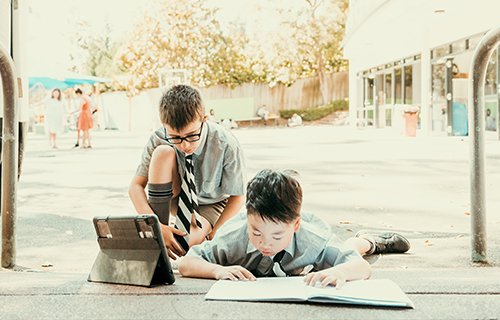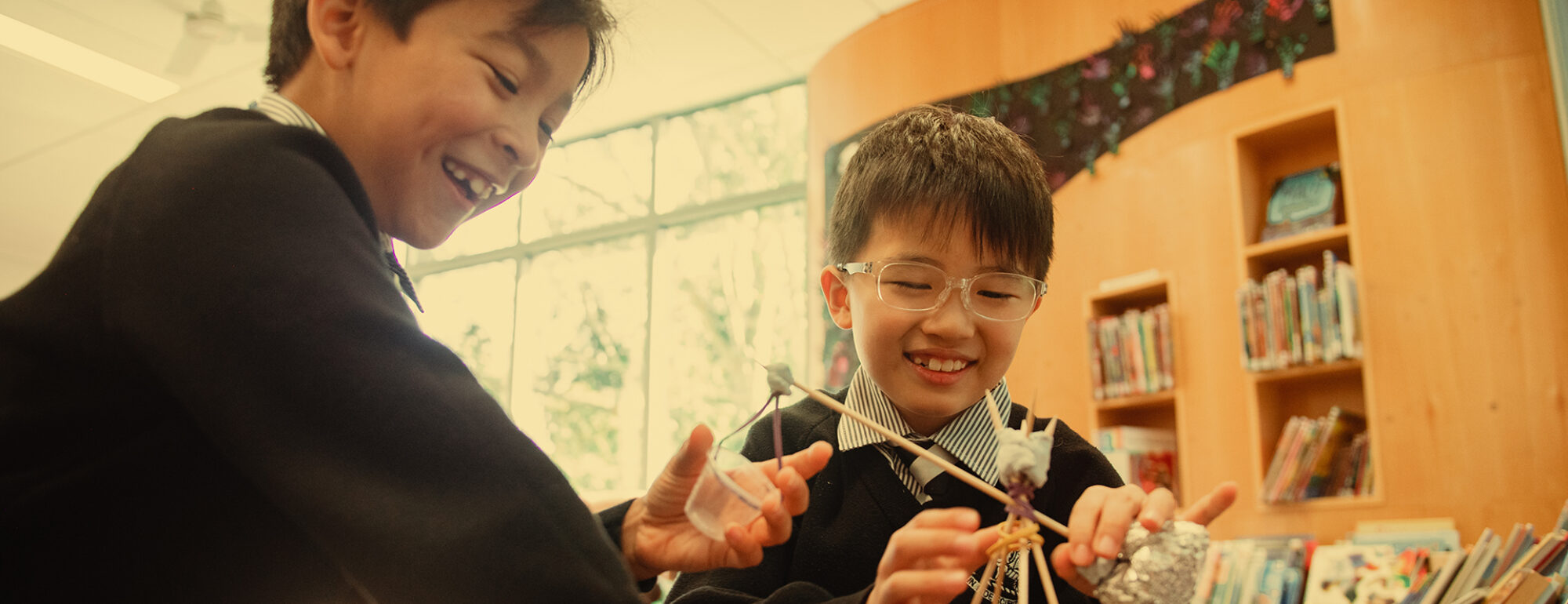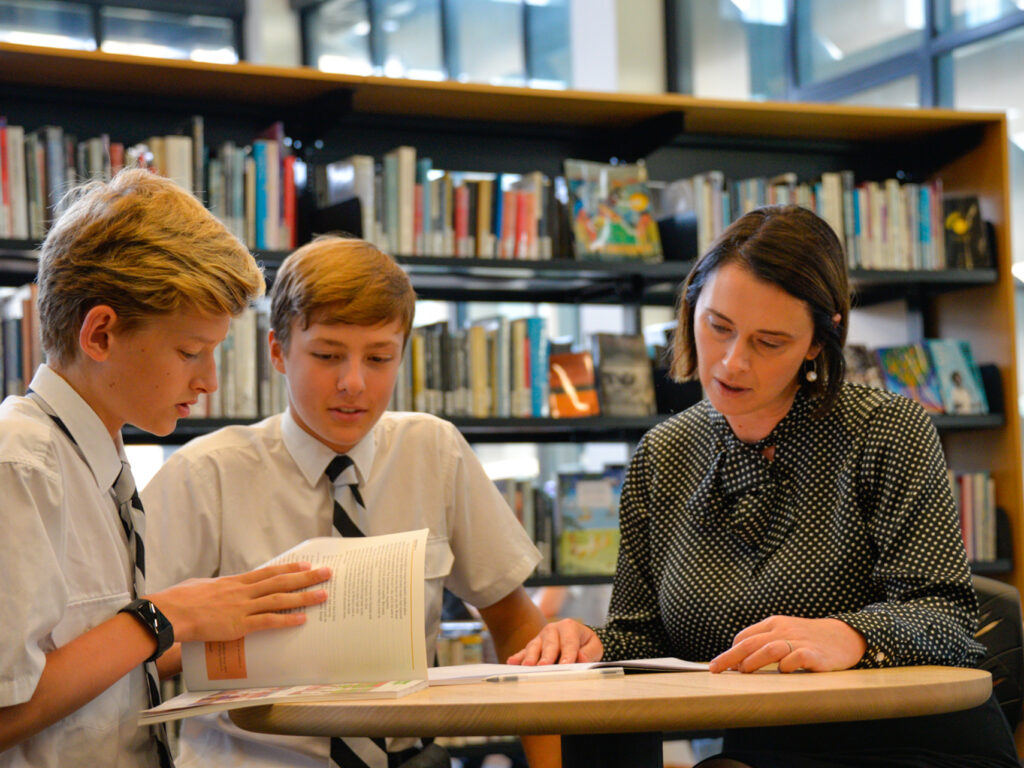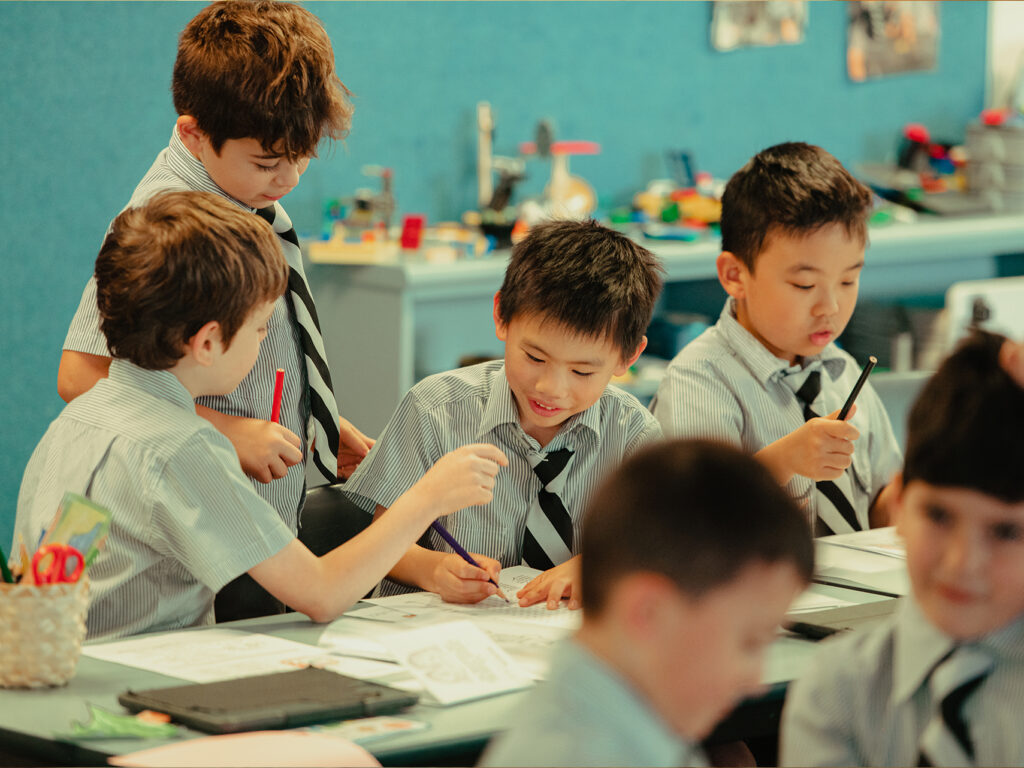Lindfield Preparatory Learning and Teaching
Reaching Potential
At Lindfield Preparatory School, we aim to provide a well-balanced, engaging learning environment with an emphasis on helping each child develop to their potential. We are preparing our students for life in 2060s, so we are not trying to replicate an education system reminiscent of the 1990s.
Lindfield is an authorised International Baccalaureate Primary Years Programme (PYP) school. Lindfield provides a Primary school education that is holistic, values-based and follows best practice to help students learn how to engage critically and effectively engage with our ever-changing world.
Click the video below to learn more about how we develop the whole child as part of our learning and teaching. From the Head of Preparatory Schools, Mr Benjamin Barrington-Higgs.
An IB World School
The mission of the IB is to develop caring, engaged young people who are active in the communities around them and who realise that other people with different opinions can also be right.
The central tenet of the Primary Years Program is developing learners who have agency, self-efficacy and embody the attributes of the IB Learner profile. It is these elements that prepare students for an unknown and very exciting future.
Student agency is about empowering students to own their learning (and school experience) through greater autonomy. It is driven by choice, voice and advocacy. Therefore we use inquiry, which values student questions, problem solving and discussion in every student’s classroom. We want students to be active in their own learning.
Self-Efficacy is a person’s belief in their ability to succeed in a particular situation. Our role as teachers is to develop students as evaluators of their own learning by setting class and individual learning goals, making judgments about their learning and helping them to self-assess their own learning.
Building students’ skills to accurately evaluate their own performance so they can accurately work out their next steps in the learning journey is crucial. This will build confidence, motivation and independence.
The IB learner profile consists of 10 attributes that encompass intellectual, personal, emotional and social growth. We all strive to be: Inquirers, Knowledgeable, Thinkers, Communicators, Principled, Open Minded, Caring, Risk Takers, Balanced and Reflective. Developing and demonstrating the attributes of the learner profile provides an important foundation for international-mindedness and importantly is a good indicator of children who display high levels of self-efficacy.
PYP – Inquiry Based Learning
Teachers at all levels are using new learning approaches to help students develop skills and understanding in key learning areas including Mathematics and English.
Kindergarten explored the concept of ‘belonging’. As part of their inquiry students collaboratively discussed the similarities and differences between each of their families, learning that diversity makes the world a more interesting place.
Stage 1 explored the concept of ‘relationships,’ which supported Lindfield’s new Personal Development program. Students identified relationships of their own and strategies used to maintain those relationships. They explained how their behaviours, particularly non-verbal language and cues, could be used to communicate a message to others.
The Stage 2 students had a taste of what it would be like to be a doctor as they studied body systems. Dressed in white lab coats, they had the opportunity to cut up organs and bones and document their observations and findings. This inquiry furthered their understanding of the interconnectedness of the human body.

English
At Newington College Lindfield we understand that the study of English allows students to make meaning through language. Through the study of English, students are able to communicate effectively and become critical and creative thinkers. Our programs of teaching and learning develop language skills through explicit teaching of speaking and listening, reading and writing, and viewing and representing.
In Early Stage 1 and Stage 1 we provide students with effective evidence based literacy instruction based around five essential components.
- Phonemic awareness
- Phonics
- Fluency
- Vocabulary
- Comprehension
To provide this evidence- based literacy instruction, Early Stage 1 and Stage 1 implements the InitiaLit program.
From Early Stage 1 to Stage 3 the study of a wide range of texts can be seen in our programs. Students read, listen to and view a variety of texts. Often these texts directly link to our Units of Inquiry through our PYP program. We refer to the texts being studied as our Mentor Texts. These texts are used to practice the skills and strategies required when reading, interpreting, analysing and evaluating texts and visual images.
Mathematics
At Newington College we understand that mathematics is a creative endeavour which requires fluency, reasoning, mathematical techniques, and effective communication skills to identify, describe and apply patterns to solve complex mathematical problems. We acknowledge and foster the use of technology in advancing our understanding of ideas and exploring concepts in novel ways.
Emphasis is placed on developing the interconnectedness of ideas across the domains of number and algebra, measurement and geometry and statistics and probability. Opportunities to link mathematics to learning in English, science and technology, history and geography are planned for. The learning of mathematics is approached with passion from both the teachers and the students. It is clearly communicated to students that all individuals can do well and achieve in mathematics and lessons are planned to provide access to all students.
Mathematics lessons are differentiated by the classroom teacher with the assistance of the Learning Enhancement Team. All students participate in mathematics lessons with the use of flexible grouping. Students operating outside their stage are supported with additional intervention/enrichment.
In K-2 student achievement in numeracy is tracked using the Schedule for Early Number which is administered twice a year. From Year 2- Year 6 students complete the NWEA Map assessment, an online adaptive assessment tool which provides data on student achievement across all mathematical strands. The assessment is administered 3 times per year. This data is used to set student goals and to inform planning and reporting to parents.
The Aim of Critical Thinking
The aim of Critical Thinking is to equip students with strategies and processes that enable them to engage critically with the world around them. This ties in with our School Vision to equip students with the skills and dispositions to live a life with a great heart and inspired mind, that is productive, ethical and fulfilled.
The goal is for every teacher at Lindfield to layer critical thinking into all areas of teaching and learning. Teaching Critical Thinking requires explicit intervention in the practice of applying tools for thinking and the skills to identify and unpack abstract concepts including:
- reason giving (justifications)
- making distinctions, suggestions, and inferences
- defining concepts and test definitions
- hypothesising
- examining generalisations
- identifying assumptions
- using examples and counterexamples
- creating and testing criteria
- reflecting.

Inclusive Learning
The Inclusive Learning Department Is a highly skilled team who plays an integral role in the education of students with disabilities, those who are neurodiverse, and students who are gifted or twice exceptional.





